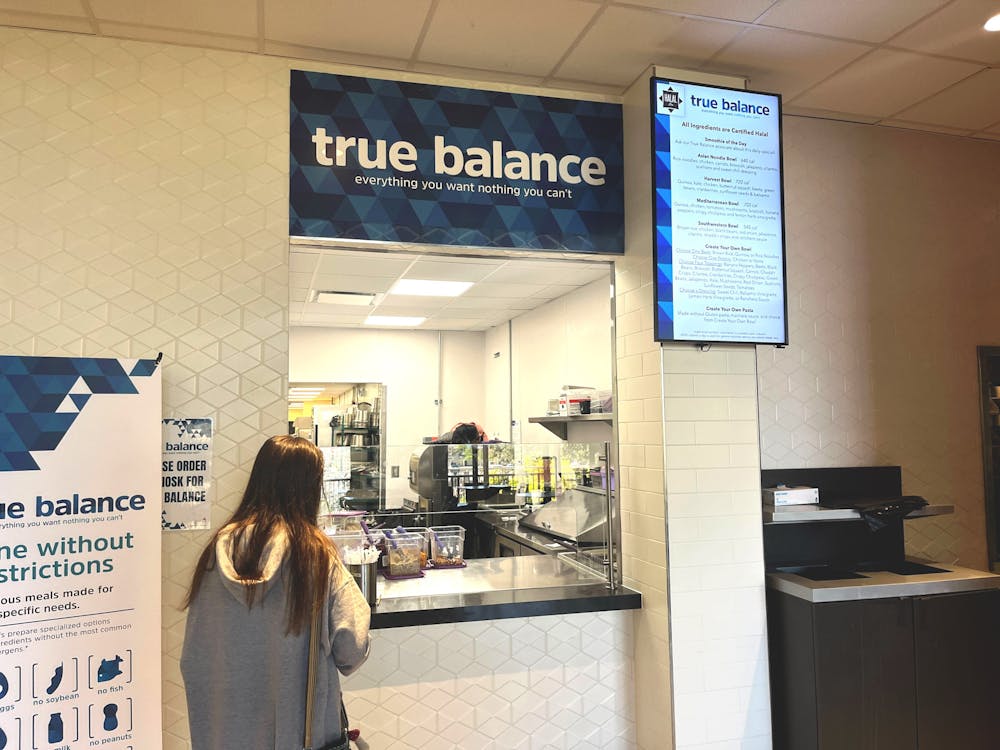Muslim and Jewish students following strict religious dietary rules now have accessible dining options available to them on campus.
USC began serving halal food at Gamecock Park’s True Balance station and kosher food at Gamecock General and Market 101 in late August 2022. The development resulted after Jewish and Muslim students pushed for the consideration of religious dietary guidelines.
The Muslim Student Association began focusing on bringing halal food to campus in spring of 2022, according to organization President Farehaa “Fay” Hussain and Vice President Farboud Khatami.
Halal is the dietary restriction of the Muslim faith, and according to Khatami, it contains two conditions: The animal consumed must be permissible by the faith, and it must be slaughtered using a certain ritual. The ritual involves prayer and humane treatment of the animal, such as giving it water and not letting it witness other animals be slaughtered. Popular forbidden items are pork and alcohol.
Miriam Rozin, a third-year mathematics student, serves as president of Jewish student organization Chabad. Rozin said that upon hearing about the Muslim Student Association's efforts to bring halal food to campus, she and some Jewish professors on campus began advocating for kosher food to be offered at USC.
"Why not do it together and make some sort of demand for it?" Rozin said.
Kosher foods conform to the Jewish faith with rules outlined in the Torah. The main outlawed food is meat and dairy combined. Like halal rules, kosher rules require that meat is slaughtered a certain way. Jewish holidays may also contain additional dietary restrictions. For instance, Passover prohibits the consumption of leavened products such as bread or pasta.
Madelyn Miller, a student leader for USC’s Hillel Foundation, said that before kosher food was available on campus, people who kept stricter kosher diets would have difficulty finding food in dining halls. Someone treating kosher laws more leniently may eat "kosher-style" foods like hamburgers, plain pizza and sandwiches, but they were not technically kosher, she said.
"It would have to be cooked in a kosher kitchen, meaning the pots and pans could never have touched things that were not kosher," Miller said.
However, according to Rozin, on some nights and holidays, students have been welcome to eat kosher meals at a rabbi’s house 20 minutes away from campus.
Before USC served halal food, Hussain and many other Muslim students would eat vegetarian food or bend certain halal rules they were comfortable not adhering to. Some even ventured off campus to buy halal food despite having university meal plans. However, since freshmen are required to have meal plans, Khatami said it is only natural for USC to offer options aligned with students' needs.
Many Jewish students said they were optimistic about the work the university has done to improve inclusivity for students.
"Even if there’s only a few, it makes those few students feel like they really matter to the university and their value and their voice has been heard," Miller said.
According to Rozin, Jewish culture has been made more public on campus since the Chabad organization came to USC. In 2021, Chabad helped start its first menorah lighting on Greene Street.
“We’re trying to make it so that you don’t have to be afraid to be Jewish, and you don’t have to be afraid of showing off who you are," Rozin said. "And having the food is just one little aspect in making sure that all parts are happy and safe and seen."

Numerous Muslim students are also confident in the school's efforts and developments. Hussain said she was excited when USC started offering halal food, and that it was one of the biggest statements USC has made to show it cares about diversity.
“It’s one thing to change your name, it’s another thing to release a statement," Hussain said. "It’s another thing to actually make tangible, edible improvements for your students."
Khatami said the university’s progress will continue to be a good thing as long as it keeps the same pace in the coming years. While it doesn’t change much of his daily routine since he’s not on a university meal plan, Khatami said it’s nice to be able to eat with his friends on campus instead of turning down plans or eating something unwanted because of a lack of options.
“Now you can actually say, 'Yes,'” Khatami said. “Should I need it, that option exists.”
However, concerns about the halal and kosher locations still remain.
Currently, one of the only sources of halal protein on campus is chicken, but Hussain and Khatami said that having seafood, eggs and beans incorporated into halal meals would provide more options for students. Khatami also said having reasonably priced halal retail locations on campus would be an improvement.
In addition to the prepackaged kosher meals in Market 101 and Gamecock General, Miller said developing a dining hall station with a fully kosher kitchen and rotating menu would be even more beneficial.
"That would be a really great option for students to get something fresh every day," Miller said.

